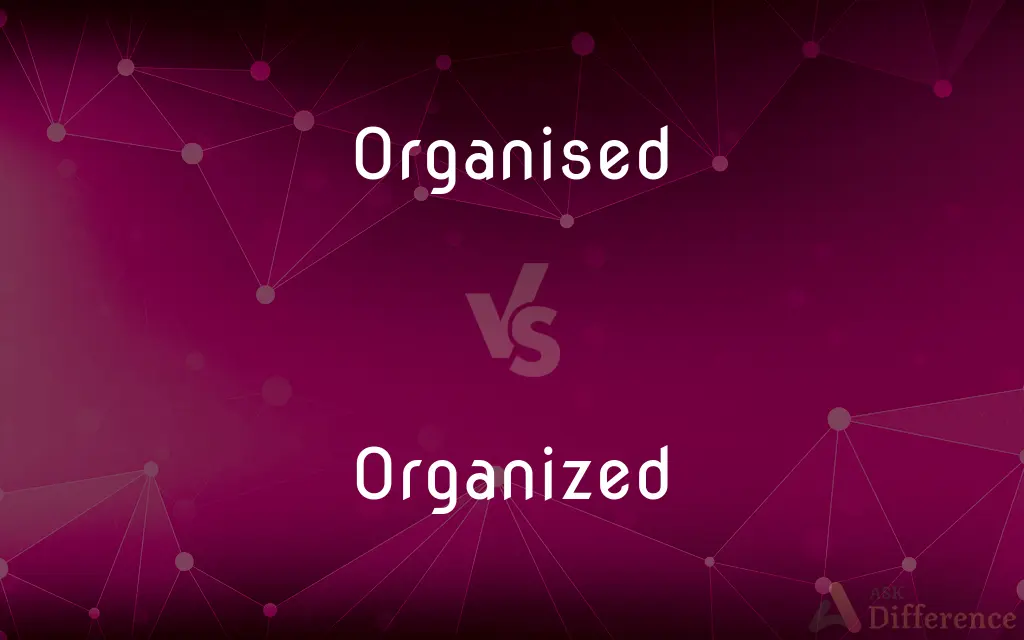Organised vs. Organized — What's the Difference?
By Tayyaba Rehman & Maham Liaqat — Updated on April 7, 2024
Organised and Organized primarily differ in spelling based on regional language conventions: 'Organised' is preferred in British English, while 'Organized' is used in American English.

Difference Between Organised and Organized
Table of Contents
ADVERTISEMENT
Key Differences
Organised and Organized both refer to the process of arranging or structuring elements in a systematic way, but they are spelled differently based on regional language conventions. In British English, 'organised' is the preferred spelling, highlighting the UK's tendency to use 'ise' endings. On the other hand, 'organized' is the spelling used in American English, which favors 'ize' endings. This difference in spelling reflects broader patterns in British and American English, affecting a range of verbs with similar endings.
The variation between 'organised' and 'organized' extends beyond spelling to reflect cultural and linguistic preferences between British and American English. While 'organised' aligns with other British spellings that prefer 's' over 'z', such as 'realise' vs. 'realize', 'organized' aligns with the American preference for 'z' in words like 'categorize'. This distinction, while seemingly minor, can indicate the origin of a text or the preferred language variety of its writer.
Pronunciation of 'organised' and 'organized' remains consistent across both British and American English, despite the spelling differences. This consistency in pronunciation despite spelling variations is a common feature in English, where phonetics do not always align directly with orthography. The primary distinction lies in written form, with spoken form unaffected by the regional spelling variations.
In addition to spelling differences, 'organised' and 'organized' can also reflect the writer's adherence to the spelling conventions of their educational or cultural background. British English often follows rules that can trace back to French influences, while American English has evolved with a greater emphasis on spelling simplification and phonetic representation. These historical and cultural influences shape not just individual words like 'organised' and 'organized' but the entirety of English spelling conventions.
Despite the differences in spelling, 'organised' and 'organized' carry the same definitions and applications in language. They both describe the act of arranging or structuring something in an orderly, systematic way. Whether organizing a closet, a database, or thoughts in writing, the concept transcends regional spelling variations, underscoring the universal importance of organization in various aspects of life and work.
ADVERTISEMENT
Comparison Chart
Preferred Region
British English
American English
Spelling Variation
Uses 's' in '-ised'
Uses 'z' in '-ized'
Pronunciation
Same as Organized
Same as Organised
Example Usage
E.g., The files were organised.
E.g., The files were organized.
Cultural Influence
Reflects British spelling norms
Reflects American spelling norms
Compare with Definitions
Organised
To arrange systematically; structure order.
The conference was organised efficiently.
Organized
To arrange in a systematic way; to structure.
The documents were organized by date.
Organised
To make preparations or arrangements.
She organised a meeting between the teams.
Organized
To make plans or arrangements; to coordinate.
He organized a surprise party for her birthday.
Organised
To form into a coherent unity or functioning whole.
He organised the volunteers into groups.
Organized
To put in order; to classify.
The data was organized into a clear report.
Organised
To coordinate activities or events.
The community organised a charity event.
Organized
To bring people together for a common purpose.
They organized a protest against the new policy.
Organised
To classify or categorize in an orderly manner.
The librarian organised the books by genre.
Organized
To form as or into a whole consisting of interdependent or coordinated parts.
She organized the students into study groups.
Organised
Alternative spelling of organized
Organized
Arranged or structured in a systematic way
About 100 cyclists took part in the ride as part of organized protests over the dangers cyclists face on the road
Without rules an organized society cannot hold together
Organised
Simple past tense and past participle of organise
Organized
Functioning in an orderly way or according to a plan
An organized charity event that raised a lot of money.
Organised
Being a member of or formed into a labor union;
Organized labor
Unionized workers
A unionized shop
Organized
Affiliated in an organization, especially a union
Organized labor.
Organized
Having the ability to plan and accomplish things in an orderly fashion
Because the moderator was organized, the meeting went quickly.
Organized
(of things or settings) Having been organized; in good order.
Your desk is so organized!
Organized
(of a person) Characterised by efficient organization.
Your desk is so neat and tidy — I've never met someone so organized before!
Organized
Unionized.
Organized
Simple past tense and past participle of organize
Organized
Same as arranged; as, an organized tour.
Organized
Formed into an organization. Opposite of unorganized.
Organized
Well-conducted. Opposite of disorganized.
Organized
Arranged according to a system or rule.
Organized
Being a member of or formed into a labor union; - of workers, used especially in the phrase \'dborganized labor. Opposite of nonunion.
Organized
Formed into a structured or coherent whole;
Organized religion
Organized crime
An organized tour
Organized
Methodical and efficient in arrangement or function;
How well organized she is
His life was almost too organized
Organized
Being a member of or formed into a labor union;
Organized labor
Unionized workers
A unionized shop
Common Curiosities
What is the main difference between 'organised' and 'organized'?
The main difference is in spelling, with 'organised' being preferred in British English and 'organized' in American English.
Is there any difference in meaning between 'organised' and 'organized'?
No, there is no difference in meaning; the difference is purely in spelling.
Does the choice between 'organised' and 'organized' affect readability?
No, the choice between these spellings does not significantly affect readability for most English speakers.
Are there other words that follow the same pattern of spelling variation?
Yes, many verbs that end in '-ize' in American English end in '-ise' in British English, such as 'realize/realise'.
Does the spelling difference affect pronunciation?
No, the pronunciation of 'organised' and 'organized' is the same in both British and American English.
Why does British English prefer 'organised' while American English prefers 'organized'?
The preference stems from historical and cultural differences in spelling conventions between British and American English.
Is the use of 'organised' vs. 'organized' a reliable indicator of a writer's origin?
It can suggest a preference for British or American spelling conventions, but it's not a definitive indicator.
Can 'organised' and 'organized' be used interchangeably?
Yes, they can be used interchangeably, depending on the regional spelling preference of the audience.
Can the spelling 'organised' be considered incorrect in American English?
While not standard, 'organised' is understandable in American English, but 'organized' is the preferred spelling.
Is one spelling more correct than the other?
No, neither spelling is more correct; the choice depends on regional language conventions.
Are there any exceptions to the rule for using 'organised' and 'organized'?
The rule is consistent for this spelling variation, though individual preference or institutional style guides may vary.
Does the difference between 'organised' and 'organized' extend to other forms of the word, like 'organization'?
Yes, the difference extends to related forms, such as 'organisation' (BrE) and 'organization' (AmE).
How should I choose between 'organised' and 'organized'?
Choose based on the regional spelling conventions of your audience or publication standards.
Do 'organised' and 'organized' have the same grammatical uses?
Yes, both forms have the same grammatical uses in sentences, differing only in regional spelling.
Can both 'organised' and 'organized' be found in English dictionaries?
Yes, both spellings are recognized and listed in most English dictionaries.
Share Your Discovery

Previous Comparison
Peculiar vs. Particular
Next Comparison
Aquamarine vs. TurquoiseAuthor Spotlight
Written by
Tayyaba RehmanTayyaba Rehman is a distinguished writer, currently serving as a primary contributor to askdifference.com. As a researcher in semantics and etymology, Tayyaba's passion for the complexity of languages and their distinctions has found a perfect home on the platform. Tayyaba delves into the intricacies of language, distinguishing between commonly confused words and phrases, thereby providing clarity for readers worldwide.
Co-written by
Maham Liaqat











































